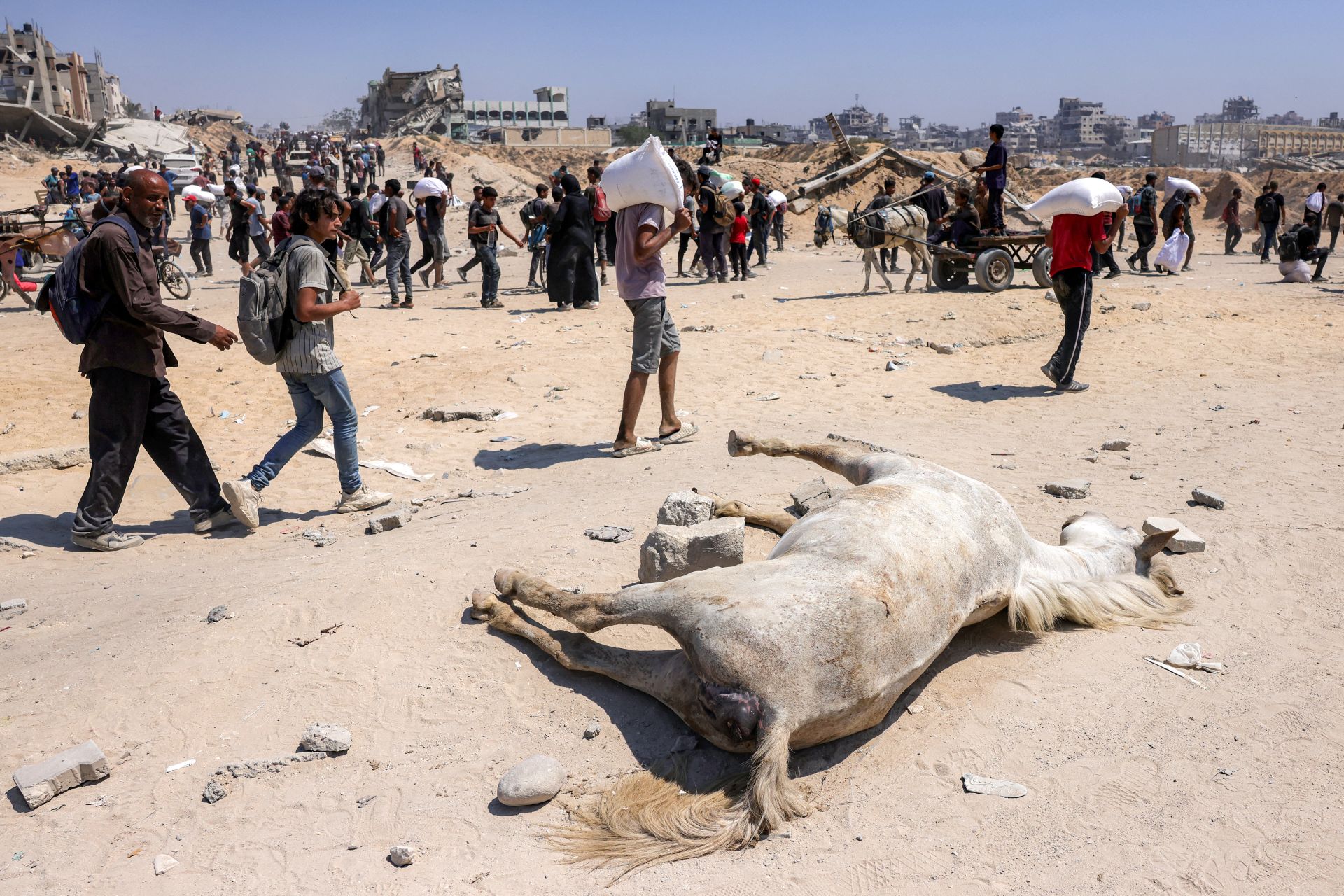- Home
- Middle East
- Trump Announces Food Distribution Centers for Gaza

People walk with humanitarian aid packages past the body of a dead horse after an aid drop on the northern Gaza Strip on July 27, 2025. ©Bashar Taleb / AFP
President Donald Trump announced Monday that the United States will soon set up food distribution centers in war-ravaged Gaza, citing signs of a “real famine.”
In the meantime, international agencies have begun delivering aid to the Palestinian territory, taking advantage of a limited pause in hostilities announced Sunday by Israel.
However, the Israeli military continued its offensive outside the hours and zones covered by the pause, with Gaza’s Civil Defense reporting 54 people killed in Israeli strikes.
In recent weeks, the UN and NGOs have warned of a growing risk of widespread famine among the more than two million people in Gaza, besieged by Israel since the war began with Hamas’s unprecedented October 7, 2023 attack.
“We want to feed the children… I mean, for some of these kids, it’s a real famine,” Trump said of Gaza.
“We’ll set up food centers where people can come freely, without restrictions. There won’t be any fences,” he added while visiting Scotland.
According to Israel, international aid brought in by 120 trucks from Egypt for the first time in months was distributed inside Gaza by the UN and other organizations.
“For the first time, I received about five kilos of flour, which I shared with my neighbor,” said Jamil Safadi, who lives in a tent in Gaza City with his wife, six children, and sick father.
“Feels Like War”
For two weeks, the 37-year-old has been waking up before dawn to search for food. On Monday, for the first time, he didn’t return empty-handed. Others weren’t as lucky, reporting looted aid or guards opening fire near distribution points.
“I saw dead and injured people. Folks have no choice but to go every day in search of flour,” said Amir al-Rash, a 33-year-old displaced man who found nothing.
Airdrops of food resumed Sunday. “Israeli planes dropped seven boxes of food. Dozens of people rushed to get them — it felt like a war,” said 23-year-old Samih Hmaid in Gaza City. “I came back with just three cans of beans. Hunger is ruthless.”
Amid growing international pressure over the humanitarian crisis, Israel announced a daily “tactical pause” from 10:00 a.m. to 8:00 p.m. (07:00 to 17:00 GMT) in certain areas of Gaza for humanitarian purposes, without specifying how long it would last.
In early March, Israel had fully blocked aid from entering Gaza, only allowing limited deliveries starting late May, causing severe shortages of food, medicine, and fuel.
Malnutrition levels in Gaza have reached “alarming levels,” the World Health Organization warned Sunday, blaming a “deliberate blockade” for many deaths.
Israel Accused of “Genocide”
Israel, which controls all access to Gaza, denies causing a humanitarian disaster and accuses Hamas of stealing aid, a charge Hamas denies, and humanitarian groups of failing to distribute it.
These organizations counter that Israeli restrictions severely hinder their work and say distributing aid in active combat zones remains extremely dangerous.
Even with new deliveries, international groups say the aid is vastly insufficient for the needs.
The UN says at least 500 to 600 trucks of food, medicine, and hygiene products are needed daily. It says “thousands of trucks, currently in Jordan and Egypt, are waiting for Israeli clearance.”
Meanwhile, two Israeli human rights groups have accused Israel of committing “genocide” in Gaza, an accusation the Netanyahu government has “strongly rejected.”
The October 7 attack killed 1,219 people in Israel, mostly civilians, according to an AFP tally based on official figures.
In response, Israel launched a massive military campaign that has killed at least 59,921 people in Gaza, mostly civilians, according to Gaza’s health ministry, figures deemed credible by the UN.
AFP
Read more



Comments